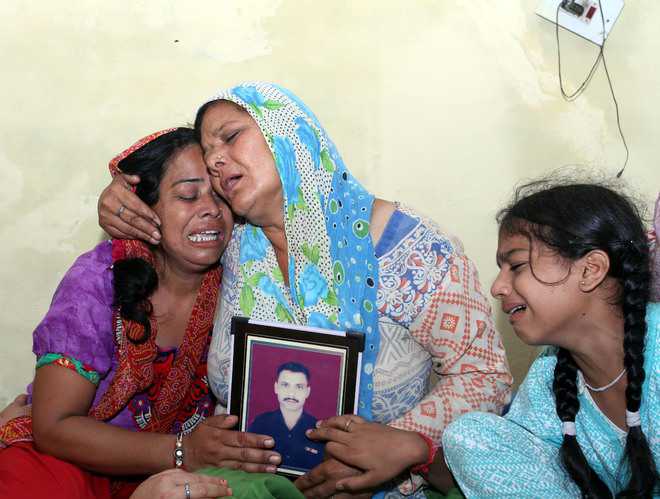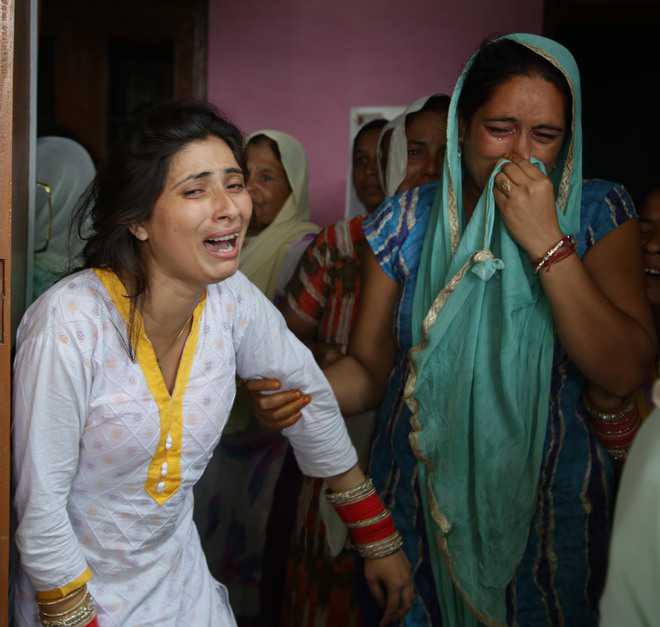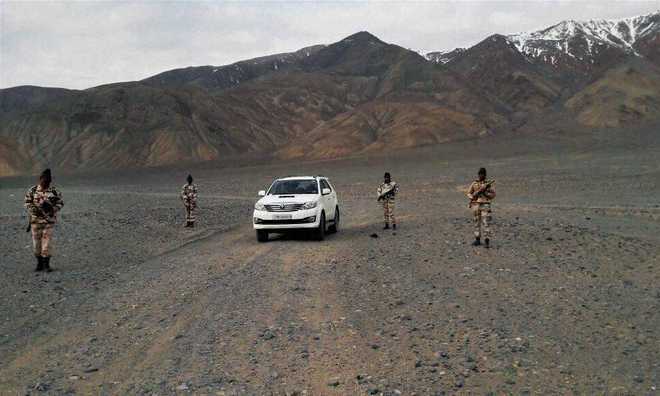Gen. Bipin Rawat, Chief of Army Staff of the Indian Army had predicted a violent summer, two months back. It is now unfolding before our very eyes. Yes, we had wished that the prediction would prove untrue, but then the general speaks with decades of experience. He also has on-demand access to technology and intelligence that most of us cannot even begin to imagine. A snap of the fingers and satellites begin to triangulate in deep space. A friendly phone call to Naval HQ, and a nuclear submarine starts transmitting data to his encrypted smartphone, via secure servers. A request to Air HQ sees AWACS (Airborne Warning & Control Systems) peek hundreds of kms inside Pakistan or China.
He controls highly trained Special Forces that can wreck absolute havoc deep inside Pakistan, even before that nation can wake up to morning tea. This I can personally vouch for, if that counts for anything. Para SF can do to Pakistan what Hanuman Ji did to Lanka when Ravana set his tail on fire.
For some mysterious reason this fearsome Katana remains in the scabbard; never used, but always alluded to. We are importing the latest weapon systems and missiles from Israel. Perhaps, we could ask them to send a little political will the next time.
It is also true that we find ourselves in this predicament with no one else to blame. It is we who are guilty of inaction, and when forced to act, of dubious action. We, a nation of 1.25 billion people, cannot find the resolve to handle a bunch of stone pelters. And we petition the world that we be invited to sit at the high table of the United Nations Security Council. We have allowed the infamous Red Corridor to thrive under our collective noses. We have permitted the Hurriyat to cock a snook at us, funding them lavishly for that one elusive day when they may proclaim to the world at large, that India is the better option for Kashmiris.
Till that day, we continue to pay a steep price. Soldiers are martyred, beheaded and humiliated. An entire region descends into Wahhabi-fuelled chaos. Children as young as five years of age are radicalized. Fighters loyal to ISIS start entering Kashmir. Army camps are attacked and soldiers killed in their sleep. An officer is kidnapped and murdered.
Our response? Shut off Internet services in the Valley. This can be one in a series of steps, but if this is your main weapon, you are clearly out of ideas. What’s the plan? That once you deny the terrorists their daily fix of social media, they will surrender in droves?
We are a weak state, and both Pakistan and China know this. Pakistan plays merry hell in Kashmir with a wink-and-nudge from China, and we do a spectacular nothing.
Especially heartbreaking is how some Indians, sometimes react on social media. I have been asked why the Indian Army is making such a fuss about the martyrdom of Lt. Umar Fayaz. Is it because he was a Muslim? Why did the Army not conduct candle light vigils when other soldiers were martyred? These questions speak of a petty mind, a mind devoid of knowledge, experience and common sense. I did not want to dignify such questions by answering them; but keep quiet and those who are devoid of common sense and heart start assuming they are right. They must be countered.
The Indian Army does not organize candlelight vigils or marches. It has never organized a single such event in over 200 years of its history, and shows no inclination towards organizing such an event in the near future. The Indian Army did not organize the said candlelight vigil/ march on 13 May 2017 at India Gate.
Shaheed Lt. Umar Fayaz was from the Rajputana Rifles, or Raj Rif as it is commonly called in the Army. The Raj Rif regimental center is in Delhi. A lot of Raj Rif veterans have settled in and around Delhi. This is true for many veterans from other regiments, as well.
Another unique factor was that Lt. Umar was kidnapped and murdered, while he was on leave. He was unarmed when he was murdered. To kill an unarmed man is not something that the Indian Army can understand or digest. It has never happened in the history of Operation Rakshak in Jammu & Kashmir. This led to a whole lot of rage within the army. You can’t murder an unarmed brother officer in cold blood and then assume that there will be no repercussions.
They killed Lt. Umar because it is stories like him that can change the narrative in Kashmir. Because in a place like Kashmir, Umar is not just a young man wearing Olive Green. He is a philosophy. He is an alternative. He tells the young what it means to be an officer in the Indian Army, and what it means to stand at “saavdhan” inside the Khetrapal Auditorium at IMA and sing “Jana, Gana, Mana”. Because when an Umar becomes Lt. Umar, he does not speak about “azaadi” and Burhan Wani. He speaks about his unit, his regiment, the Flag, the Constitution and the Anthem. It is okay to be Umar. But when you become Lt. Umar, you are on collision course with Jihadi ideology.
Lt. Umar was dangerous. He was changing the thinking of people…telling them that India was their Mother and disloyalty to Mother India was blasphemy. For the very survival of those who seek to harm India, Lt. Umar could not be allowed to live. So, they hatched a cowardly plot and kidnapped him at gunpoint when he was sitting at his sister’s wedding.
Delhi is home to an entire spectrum of media houses. And, Noida, Gurgaon, Ghaziabad, Faridabad and Greater Noida surround Delhi. Veteran communities are very active in these areas.
A few veterans started off the candlelight march. I was asked to support the march, which I did. The news spread through ex-servicemen networks and soon, I heard of veterans renting buses to come to Delhi. They came from Sonipat, Rewari, Panipat, Bhiwani and Jind. This is the Jat and Ahir belt of Haryana. These semi-arid lands have, for generations, given birth to warriors who drew a line of blood from Ghazni to Burma and from Flanders to Dograi. These lands have also given us the legend of Rezang La.
These are “Fauji” belts. Almost every home has a veteran. Or a story.
At one corner of the park, there were elderly Rajputana Rifles veterans wearing white kurtas with colorful “safas”. I spoke to them. They bore names like Rathore, Chauhan, Shekhawat and Bhati. These were Rajputs from far-flung deserts villages of Rajasthan. They came to pay homage to their “sahab”, an officer they had never even seen. Lt. Umar was probably not even born when these veterans had retired.
What relationship does an octogenarian Hindu from Haryana or Rajasthan have with a twenty-two year old Muslim man from Kashmir? Why does a young Rajput teenager touch his grandfather’s feet and swear vengeance for the death of that young Muslim man? What prompts a serving army officer’s wife to break down and say that her young son, all of 12 years, will one day join the army to avenge Umar? For all those who saw a political angle of minority appeasement in that gathering of 13 May, I have no other words or explanation to offer.
I address the naysayers when I say this. I sincerely seek apology if I sound rude, but unless you have worn the uniform I would find it impossible to explain, and you would fine it difficult to understand. There are bonds that run deeper than religion, caste and race. These are bonds forged by blood spilt together. When a man is dying, screaming in agony, with his head on your lap and he calls you his brother, you tend to forget which God he prayed to.
The Indian Army is not fighting elections in Kashmir that it has to resort to minority appeasement. Please think about this. You have every right to question your army, but I think the Indian Army has earned enough respect that when you do question it; you do not wear the same glasses that you do while questioning your local politician.
Kashmir is no longer a political problem. It was, some time back. It no longer is. As I write these lines, the Hizb-ul Mujahedeen is desperately seeking to bring its willful commander, Zakir Musa, back into the folds. Reports from the Valley say that Musa is forming another terror group, one that owes allegiance to al-Qaeda. Apparently, cutting off the heads of Hurriyat leaders and displaying them at Lal Chowk is no longer a deal breaker.
Why is the HM trying to get Musa back? Because its masters in Rawalpindi know that “Kashmir Mangey Azaadi” no longer pulls at the heartstrings, as it used to. Radical, militant Islam now drives the narrative in Kashmir. Most Kashmiris are being weaned away from the argument of the UN Resolution in Kashmir. The new argument is that Kashmir wants to be part of Pakistan because Pakistan is an Islamic nation. They don’t want “Azaadi”. They want Nizam-e-Mustafa.
What is this fuss about Kashmiriyat, Jamhooriyat and Insaniyat? Kashmiriyat died on 19 January 1990. It was on that day when Maulvis proclaimed loudly from mosques that Kashmiri Hindus has two hours to leave their homes, and that they must leave their women behind. Lets stop beating a dead horse.
We see ISIS flags in downtown Srinagar and it bothers us not a bit. In any other country, it would have been the perfect justification for ordering an air strike. But this is India, after all. Strong condemnation is often the preferred substitute for a Hellfire missile.
The Kashmir Valley is placed precariously on edge. This is also our doing. Let us, for one minute not put the entire blame on Pakistan alone, notwithstanding the fact that its sins are many. Pakistan started the problem. We let it grow due to our submissive approach.
Quoting a famous Quranic Hadees, I have said before that “paradise is under the shade of swords”. What you truly love, you must be willing to defend with violence.
Lt. Umar was from the Rajputana Rifles. The motto of the regiment is “Veer Bhogya Vasundhara”. The brave shall inherit the earth.
The regiment is telling us something. It is time to listen.
Major Gaurav Arya (Veteran)
#MajorGauravArya #OnlyTheBrave #IndianArmy #ADGPI

















































































































